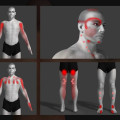Addiction is a complex disorder that affects the brain's functioning. The part of the brain that is responsible for addiction is known as the mesolimbic dopamine pathway, or the reward circuit. This pathway begins in the ventral tegmental area (VTA) located above the brain stem. To better understand the causes of addiction and how this area of the brain is affected, it's important to look at two regions of the brain: the prefrontal cortex and the midbrain.
These two regions have distinct functions that help maintain homeostasis. The two parts of the brain most impacted by addiction are the primitive brain, or reptile brain, and the neomammalian cortex, or human brain. Magnetic resonance imaging studies have also revealed that people with addictions have a hyperactive cerebellum when exposed to stimuli related to their addiction, such as images of syringes. By learning more about which part of the brain controls addiction, we can gain insight into factors that go beyond reasoning and perceived impulse control.
Addiction specialists have found that people with active addictions experience abnormalities in their reptilian brain.






